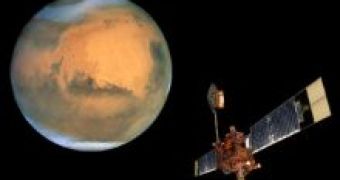Mars Global Surveyor, the oldest of the six spacecrafts currently active at the red planet, might have just joined the other seven inactive crafts on the planet - which have either ended their missions or have crushed at arrival. The still active crafts include two orbiting satellites sent by NASA and one sent by ESA and the Spirit and Opportunity Mars rovers.
Nobody knows why the Mars Global Surveyor (MGS) fell silent several weeks ago. The scientists at NASA have tried to use Mars Reconnaissance Orbiter (MRO) to locate the veteran orbiter, but to no avail. Insofar, they haven't asked for the help of ESA who could use Mars Express.
"We may have lost a dear old friend and teacher, Mars Global Surveyor," said Michael Meyer, lead scientist for the Mars Explorations Program at NASA Headquarters in Washington, D.C.
NASA scientists have last heard of MGS on November 5 and they were notified by the probe that it has certain problems with one solar panel. Since then, ground controllers tried in vain to bring the probe back on line. More than 800 command files were sent to re-establish communication with MGS, but all of them failed.
"In the last two weeks we have not been able to establish communication with the spacecraft in a normal fashion," said Fuk Li, Mars Program Manager at JPL. "Our preliminary analysis so far has not yielded any definitive sighting of MGS," Li said about the attempts to spot the probe with the help of the MRO.
According to Tom Thorpe, Project Manager for the MGS at JPL, not all hope is lost because - in principle - the probe could survive for a while with only one solar panel.
"The power could be supported on only one panel. As long as we're getting enough power the spacecraft is capable of maintaining itself. We have attitude gas, for example, that could keep us in this mode for one or two years. It's anybody's guess as to where that stuck panel is pointed? but we feel that there's a good chance that we're getting enough power to maintain operations," Thorpe explained to SPACE.com.
MGS had recently celebrated a decade of space exploration. It was launched on November 7, 1996. Scientists had designed the probe only for a year, but it surpassed the expectations and its mission was extended repeatedly. Now it seems that it ran out of luck.
"While we have not exhausted everything that we could do we believe that the prospect of recovery of MGS is not looking very good at all," Li explained. "It's been a good friend and we are certainly feeling we might be losing a good friend from our family here."

 14 DAY TRIAL //
14 DAY TRIAL // 
